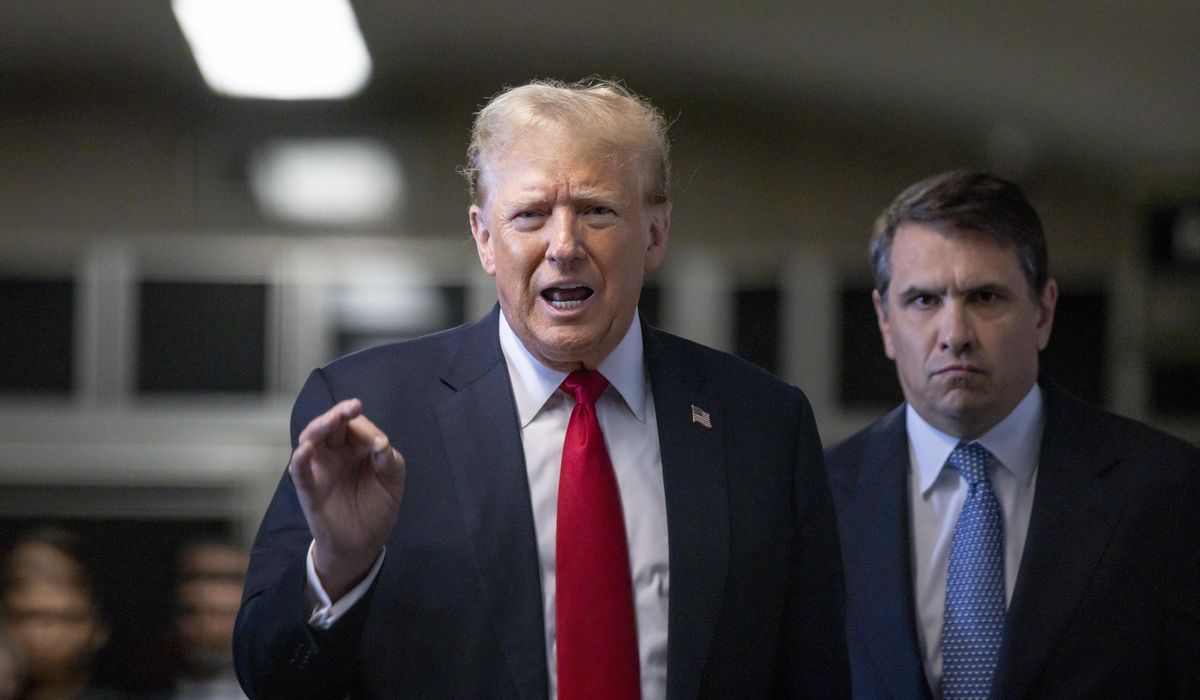


NEW YORK — Former President Donald Trump’s lawyer told jurors Tuesday they “should want and expect more” from prosecutors who claim the presumptive GOP nominee engaged in business fraud to boost his first run for the White House.
Defense attorney Todd Blanche, in his closing argument, said the state’s evidence showed little more than standard business practices.
“President Trump is innocent. He did not commit any crimes, and the district attorney has not met their burden of proof, period,” Mr. Blanche said as Mr. Trump’s hush money trial neared its conclusion.
Prosecutors allege Mr. Trump used his lawyer Michael Cohen to pay $130,000 to porn star Stormy Daniels near the 2016 election because she was shopping a story about an alleged sexual encounter with Mr. Trump in 2006. They say Mr. Trump orchestrated an illegal plot to conceal repayment to Mr. Cohen.
Mr. Trump is charged with 34 counts of falsifying business records with an intent to affect the election.
Mr. Blanche said Mr. Trump paid standard legal fees to Mr. Cohen while serving as president in 2017, despite Mr. Cohen’s claim the checks were repayment for the Daniels job.
Mr. Cohen is a convicted felon with a penchant for lying, the defense said, warning jurors it would be foolhardy to accept his version of events.
“You should want and expect more than the testimony of Michael Cohen,” Mr. Blanche said before criticizing Ms. Daniels.
Jurors watched intently as Mr. Blanche used PowerPoint slides to highlight checks and invoices at the heart of the case.
The lawyer tried to undercut prosecutors’ claims Mr. Trump and his tabloid friends were part of a “catch and kill” conspiracy, noting National Enquirer executive David Pecker would have run a Trump Tower doorman’s story about a love child if it were true, and that Playboy model Karen McDougal didn’t want her story about an affair with Mr. Trump to be published. She just wanted to leverage it for magazine jobs.
Mr. Blanche said Ms. Daniels took advantage of the “Access Hollywood” audio, in which Mr. Trump spoke crudely about women, to exhort Mr. Trump on the cusp of the 2016 campaign, only for Mr. Pecker to say he wouldn’t be part of any payment.
Yet the case, the defense presentation said, “turns on Cohen.”
Mr. Blanche hammered Mr. Cohen over and over, saying he lied about key meetings and his claim he would “work for free” when Mr. Trump became president.
Most notably, Mr. Blanche said Mr. Cohen is the only person claiming Mr. Trump knew about the payment to Ms. Daniels. The defense argues Mr. Cohen paid Ms. Daniels, on his own, to get an attaboy from his boss around the campaign.
Mr. Cohen “wanted to do it because he knew he could get credit — for supposedly doing something to help Mr. Trump — at some later time,” Mr. Blanche said.
He also said the state’s math around the payments doesn’t add up. Prosecutors say Mr. Trump paid Mr. Cohen $420,000 in 2017 to cover the Daniels payment, a bonus for Mr. Cohen, payments for tech services, plus a “grossing up” of the amount to account for taxes.
Mr. Blanche said the idea that Mr. Trump paid Mr. Cohen $420,000, “even though he only owed him 130 [thousand], is absurd.”
Assistants to Manhattan District Attorney Alvin Bragg will deliver a closing argument after Mr. Blanche. The summations are expected to take all day.
When they’re over, state Supreme Court Judge Juan Merchan will instruct the jury on the law so deliberations can begin in the first criminal trial of a former U.S. president.
Mr. Bragg and his team say Mr. Trump took criminal steps to conceal the payments by falsifying invoices and issuing checks to Mr. Cohen that were logged as other expenses.
Mr. Trump says Mr. Bragg is targeting him at the behest of President Biden to influence the current campaign.
The charges are felony counts because prosecutors allege records were falsified to conceal a secondary object crime, in this case a scheme to violate election or tax laws.
Mr. Blanche said the prosecution concocted a scheme out of thin air. He pointed to Mr. Cohen’s role as personal attorney to the president in 2017, meaning legal fees would seem reasonable to then-President Trump, and that Trump Organization employees logged payments correctly.
“Were those bookings done with an attempt to defraud? That’s why you’re here,” Mr. Blanche said. “The bookings were accurate and there was absolutely no attempt to defraud.”
Mr. Blanche said Mr. Trump disclosed the payments on IRS and ethics forms, so he wasn’t trying to conceal them from tax authorities, and it was “standard operating procedure” for campaigns to influence coverage and bury unflattering stories.
“Every campaign in this country is a conspiracy to promote a candidate, a group of people who are working together to help somebody win,” Mr. Blanche said. “This is not a crime.”
• Tom Howell Jr. can be reached at thowell@washingtontimes.com.
